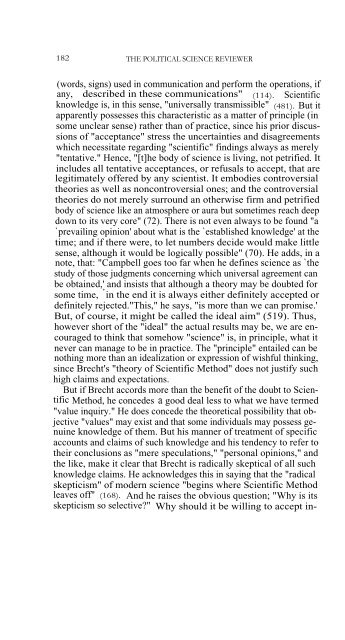ARNOLD BRECHT'S POLITICAL THEORY REVISITED Political ...
ARNOLD BRECHT'S POLITICAL THEORY REVISITED Political ...
ARNOLD BRECHT'S POLITICAL THEORY REVISITED Political ...
You also want an ePaper? Increase the reach of your titles
YUMPU automatically turns print PDFs into web optimized ePapers that Google loves.
182 THE <strong>POLITICAL</strong> SCIENCE REVIEWER<br />
(words, signs) used in communication and perform the operations, if<br />
any, described in these communications" (114). Scientific<br />
knowledge is, in this sense, "universally transmissible" (481). But it<br />
apparently possesses this characteristic as a matter of principle (in<br />
some unclear sense) rather than of practice, since his prior discussions<br />
of "acceptance" stress the uncertainties and disagreements<br />
which necessitate regarding "scientific" findings always as merely<br />
"tentative." Hence, "[t]he body of science is living, not petrified. It<br />
includes all tentative acceptances, or refusals to accept, that are<br />
legitimately offered by any scientist. It embodies controversial<br />
theories as well as noncontroversial ones; and the controversial<br />
theories do not merely surround an otherwise firm and petrified<br />
body of science like an atmosphere or aura but sometimes reach deep<br />
down to its very core" (72). There is not even always to be found "a<br />
`prevailing opinion' about what is the `established knowledge' at the<br />
time; and if there were, to let numbers decide would make little<br />
sense, although it would be logically possible" (70). He adds, in a<br />
note, that: "Campbell goes too far when he defines science as `the<br />
study of those judgments concerning which universal agreement can<br />
be obtained,' and insists that although a theory may be doubted for<br />
some time, ' in the end it is always either definitely accepted or<br />
definitely rejected."This," he says, "is more than we can promise.'<br />
But, of course, it might be called the ideal aim" (519). Thus,<br />
however short of the "ideal" the actual results may be, we are encouraged<br />
to think that somehow "science" is, in principle, what it<br />
never can manage to be in practice. The "principle" entailed can be<br />
nothing more than an idealization or expression of wishful thinking,<br />
since Brecht's "theory of Scientific Method" does not justify such<br />
high claims and expectations.<br />
But if Brecht accords more than the benefit of the doubt to Scientific<br />
Method, he concedes a good deal less to what we have termed<br />
"value inquiry." He does concede the theoretical possibility that objective<br />
"values" may exist and that some individuals may possess genuine<br />
knowledge of them. But his manner of treatment of specific<br />
accounts and claims of such knowledge and his tendency to refer to<br />
their conclusions as "mere speculations," "personal opinions," and<br />
the like, make it clear that Brecht is radically skeptical of all such<br />
knowledge claims. He acknowledges this in saying that the "radical<br />
skepticism" of modern science "begins where Scientific Method<br />
leaves off" (168). And he raises the obvious question; "Why is its<br />
skepticism so selective?" Why should it be willing to accept in-
















